AKT Inhibitors: A potential Cancer Immunotherapy Target
Mar 24, 2017
Targeted therapy is the most preferred option for cancer treatment and a number of new targets are being discovered which target cancer specific receptors, AKT being one of them. Protein kinase B (PKB), also known as AKT, belongs to serine/threonine protein kinase superfamily. AKT has been validated as a potential target as it plays a central role in many types of cancer, and studies have proven that the AKT signaling cascade is frequently impaired in many types of cancer and, in some cases; it is associated with tumor aggressiveness.
Also, AKT/PI3K pathway is an important signal transduction pathway and it has been observed that PI3K is overexpressed in ovarian and cervical cancer, along with causing mutations associated with breast cancer, glioblastoma and gastric cancer. Since AKT pathway plays a critical role in regulation of cell’s apoptotic pathway and AKT/PI3K pathway, it is being studied extensively as a target for cancer therapy.
The AKT Inhibitors pipeline has a number of drugs under development but in spite of increasing knowledge regarding AKT functions and activation, no AKT inhibitor has yet been approved for oncologic use. All the major components of the AKT pathway which consists of PI3Ks, PDK1, AKT and mTOR, are the focus of research for targeted cancer therapy, however, till now a limited number of drugs has emerged from this approach.
Downloads
Click Here To Get the Article in PDF
Recent Articles
- Golcadomide and Rituximab Combo Unveils Promising Efficacy in Heavily Pretreated Relapsed/Refract...
- Progenics got FDA Approval; Curcumin to cancer cells
- Assessment of Key Products that Got FDA Approval in Second Half (H2) of 2021
- Merck and Moderna Initiate Study to Evaluate V940; FDA Approves Vertex and CRISPR Therapeutics’ C...
- Identity Crises Faced by a Venerable Brain-Cancer Cell Line
Midostaurin by Novartis is in pivotal stage of development for FLT3-mutated acute myeloid leukemia (AML) which has shown good results and is expected to be the first AKT Inhibitor to be approved. Major companies like Genentech, Novartis, Merck and GlaxoSmithKline are in the race for AKT inhibitors development and are expected to enter the pivotal stage soon. No approved drugs and the vast potential of AKT Inhibitors are thus the major driving factors for AKT Inhibitors pipeline.
Insight By:
Tejaswini Reddy
Associate Analyst
DelveInsight is a leading Business Consulting and Market Research Firm. We help our clients to find answers relevant to their business, facilitating their decision-making. DelveInsight also serves as a knowledge partner for business strategy and market research. We provide comprehensive analytical reports across various therapeutic indications. DelveInsight has a database of 3000+ high-quality analytical reports.
Downloads
Article in PDF




